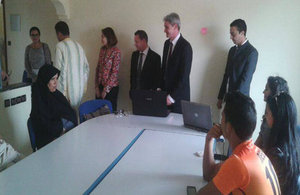Constituency Outreach project bridges the gap between citizens and their elected representatives
Our Arab Partnership funded project “Constituency Outreach: Providing Avenues for Citizens Access to Elected Representatives”.

Adil Tchikitou at his constituency office
Fridays in Morocco are generally calm, quiet, days. But not for the young Member of Parliament we visited on 11 July. When David Williams, Deputy Head of North Africa Department, along with the Embassy projects team and staff from the project implementer the National Democratic Institute (NDI) visited one of the constituency offices funded by the British Embassy’s constituency outreach project, we found it buzzing with activity. The MP we visited, Mr. Tchikitou, is one of those participating in the Arab Partnership funded project “Constituency Outreach: Providing Avenues for Citizens Access to Elected Representatives”.
The narrow stairs to the fourth floor office-apartment did not seem to impede constituents in seeking out their representative, and the range of citizens who come to see their MP was very broad, encompassing all age and gender groups. During our own visit an old man walking with the aid of crutches arrived to raise his issues with Mr. Tchikitou while, in a separate room, a group of youth activists were busy on computers compiling a DVD to promote local democracy.
Although newly established, the office has already resolved a number of constituents’ issues. In one case, the family wanted to ensure that their young son received the psychiatric help he needed in prison. The father heard about the newly established office and approached the MP whose assistance helped in securing a transfer to hospital for the young man. According to the MP, “interventions like these help re-establish trust and confidence between citizens and their elected representatives and this is very important”.
Within this project, NDI has helped 14 MPs establish and manage constituency offices which have collectively resolved 134 of the 1,069 cases received since opening in January 2014. This is all part of the UK’s efforts to support the democratic reform process in Morocco, in particular the importance of interaction between citizens and those they elect.